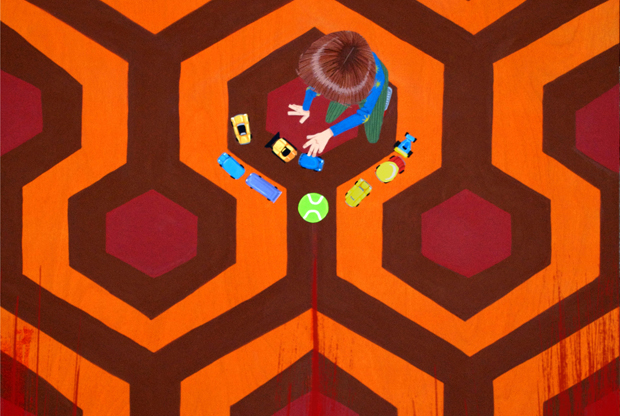 Folks seem to love or hate Stanley Kubrick’s film The Shining. I still remember seeing it in the theater, and it remains one of my favorite horror films that is worth repeated viewing.
Folks seem to love or hate Stanley Kubrick’s film The Shining. I still remember seeing it in the theater, and it remains one of my favorite horror films that is worth repeated viewing.
Over the years the film has become the subject of interpretive controversy, with some pointing out many alleged continuity errors, and others arguing that these are better understood as deliberate acts of symbolic meaning. This controversy deepens with the documentary Room 237. One of the interpretive possibilities explored in this new film is that Kubrick may have been providing commentary on the Holocaust, a subject that could not be dealt with directly at the time in which The Shining was made. This possibility was intriguing enough for Tablet: A New Read on Jewish Life, to tackle the issue in an article titled “The Shining Is About What? Room 237 uses Talmudic exegesis to uncover whether Kubrick’s film is about Indians, the Holocaust, or bears.” The author, Abbie Argulies, finds merit in at least some of what the documentary has to offer, particularly that Kubrick may have incorporated veiled references and commentary on one of the greatest atrocities of the twentieth century:
As a doctor’s son from an assimilated family, raised in the tonier precincts of the Bronx during a period when the borough was over 40 percent Jewish, Kubrick would have been deeply impressed by the rise of Nazism that coincided with his childhood and the extermination of Europe’s Jews that occurred during his safe and secure Grand Concourse adolescence. (Cocks, the author of numerous scholarly works on the Nazi regime, including Psychotherapy in the Third Reich, has even devoted a book to Kubrick and the Holocaust.) Kubrick made three movies—Paths of Glory, Dr. Strangelove, and Full Metal Jacket—that overtly concern state-sanctioned murder, while 2001 and A Clockwork Orange take an extremely dim view of human nature. He also had a more direct connection to Nazi Germany, having married the niece of Goebbels’ favorite filmmaker, Veit Harlan. (For more on Kubrick’s life and fascination with the Holocaust, see “Kubrick’s Lost Holocaust Film,” by Abby Margulies, in today’s Tablet Magazine.)
It’s known that Kubrick did actively contemplate a movie on the Holocaust, studying The Destruction of the European Jews by Raul Hilberg, and sending his brother-in-law Jan Harlan to New York in 1976 to persuade Isaac Bashevis Singer to write a screenplay on the subject. Singer demurred, but in 1991, Kubrick acquired the rights to Louis Begley’s autobiographical novella Wartime Lies, which concerns a Jewish boy passing for Catholic to survive the war in Nazi-occupied Poland. The project, titled Aryan Papers, was announced for 1993 and then shut down, perhaps not coincidentally, around the time Steven Spielberg began working on Schindler’s List. (The latter is a movie Kubrick famously disparaged, telling Frederic Raphael, his writing partner on Eyes Wide Shut, that it was about “success” rather than genocide. “The Holocaust is about 6 million people who get killed. Schindler’s List is about 600 who don’t.”)
No doubt Room 237 will not settle any interpretive squabbles but will instead add fuel to the fire. The producers may venture too far and too deep in their speculation, but hopefully we can at least enjoy the journey as we probe one of the best horror films of the 1980s in more depth.





There are no responses yet